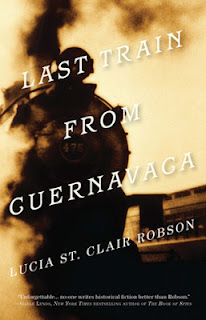Last Train From Cuernavaca
Last Train From Cuernavaca won the Spur Award, awarded by the Western Writers of America. This is notable because the novel does not spend one moment in any part of what would become the United States, and it takes place in 1913, the last gasp of what would generally be considered the Old West. Most notably, the book really isn't that good.
Set during the bloody Mexican revolution, Lucia St. Clair Robson would seem to have researched her topic well. I'm no expert, so I don't know if everything is authentic here. She points out in an afterward that two of the characters are based on real people, and of course the off-page characters, such as Emiliano Zapata and Porfirio Diaz, were quite real.
Robson's story covers two threads. One is the romance between Rico Martin, a captain in the Mexican army, and Grace Knight, the English owner of a hotel in Cuernavaca. He is urbane, Harvard-educated, and rakish, while she is a widow and initially scoffs at this advances. But soon enough they are deeply in love, and we head into Harlequin Romance territory. Of course they become separated, and at different stages both believe the other to be dead, which is stretching it even for a daytime soap opera.
The other, more interesting thread, follows Angela Sanchez. When her parents are run off their land, she joins up with Zapata, but since she is a 15-year-old girl, she shoves her hair under her at and soon is known as Lieutenant Angel. She takes no grief from anyone: "'May snakes and toads crawl out of your mouth,' Angela called after him. 'May your insignificant penis shrivel up like a chili pepper.'"
These two threads will intersect, and ultimately come to a respectful agreement against the excesses to the Mexican government, in the form of a Colonel Rubio, also known as Fatso. Martin will rescue a peasant girl from being raped by the Colonel, which earns him a bounty on his head. But since he was part of the military establishment, Angel would like to see him hang. Grace is also kidnapped by Angel's band, but earns her respect, typified by this somewhat ludicrous passage: "The gringa could now clean and and load rifles. She could ignite tinder with a fire drill. She could hone a knife blade and pat out tortillas that were edible if not asymmetrical. But although she was tanned, calloused, and trouser-clad, Inglesa still stuck like a long-stemmed rose among the hardy cactus flower of the women's camp."
I lost patience early in this book, and I lost the thread of who was against who and why, and where everybody was (a map would have been helpful). The prose, as seen above, tends to the purple. I think there's a good novel about the Mexican revolution (I'm sure there have been several) but this is not one of them.
Set during the bloody Mexican revolution, Lucia St. Clair Robson would seem to have researched her topic well. I'm no expert, so I don't know if everything is authentic here. She points out in an afterward that two of the characters are based on real people, and of course the off-page characters, such as Emiliano Zapata and Porfirio Diaz, were quite real.
Robson's story covers two threads. One is the romance between Rico Martin, a captain in the Mexican army, and Grace Knight, the English owner of a hotel in Cuernavaca. He is urbane, Harvard-educated, and rakish, while she is a widow and initially scoffs at this advances. But soon enough they are deeply in love, and we head into Harlequin Romance territory. Of course they become separated, and at different stages both believe the other to be dead, which is stretching it even for a daytime soap opera.
The other, more interesting thread, follows Angela Sanchez. When her parents are run off their land, she joins up with Zapata, but since she is a 15-year-old girl, she shoves her hair under her at and soon is known as Lieutenant Angel. She takes no grief from anyone: "'May snakes and toads crawl out of your mouth,' Angela called after him. 'May your insignificant penis shrivel up like a chili pepper.'"
These two threads will intersect, and ultimately come to a respectful agreement against the excesses to the Mexican government, in the form of a Colonel Rubio, also known as Fatso. Martin will rescue a peasant girl from being raped by the Colonel, which earns him a bounty on his head. But since he was part of the military establishment, Angel would like to see him hang. Grace is also kidnapped by Angel's band, but earns her respect, typified by this somewhat ludicrous passage: "The gringa could now clean and and load rifles. She could ignite tinder with a fire drill. She could hone a knife blade and pat out tortillas that were edible if not asymmetrical. But although she was tanned, calloused, and trouser-clad, Inglesa still stuck like a long-stemmed rose among the hardy cactus flower of the women's camp."
I lost patience early in this book, and I lost the thread of who was against who and why, and where everybody was (a map would have been helpful). The prose, as seen above, tends to the purple. I think there's a good novel about the Mexican revolution (I'm sure there have been several) but this is not one of them.



Comments
Post a Comment